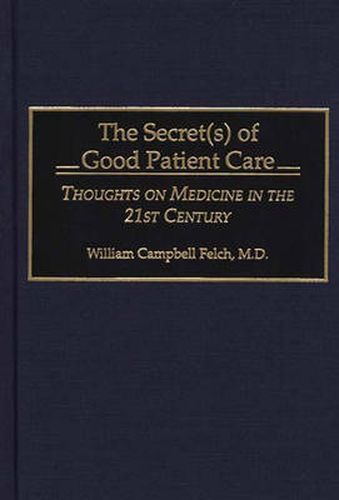Readings Newsletter
Become a Readings Member to make your shopping experience even easier.
Sign in or sign up for free!
You’re not far away from qualifying for FREE standard shipping within Australia
You’ve qualified for FREE standard shipping within Australia
The cart is loading…






One of the few practicing physicians to be elected to the National Academy of Sciences’ Institute of Medicine and one of a rare breed of doctors who writes with clarity, Dr. Felch describes his 40-year experience in the mainstream of medical care. Both as a primary care physician making house calls and as a leader in medical professional organisations, Felch reflects on everyday matters of patient care, pointing out that they are actually complex, multifaceted, and unique. He points out that today’s patients frequently give high marks to their physicians for competence and proficiency, but low marks for compassion and caring. He says our scientific enterprise is exceedingly good at generating new technology, very good at carrying out basic laboratory research, quite good at mounting large clinical studies of new pharmaceuticals, but only fair at converting collective data about disease into clear-cut strategies for doctors to use with their individual patients. Readers of this book, including potential doctors, should come away with a clearer understanding of the specific activities of medical school, residency training, and patient care as a practitioner, including the problems encountered and the values received.
$9.00 standard shipping within Australia
FREE standard shipping within Australia for orders over $100.00
Express & International shipping calculated at checkout
One of the few practicing physicians to be elected to the National Academy of Sciences’ Institute of Medicine and one of a rare breed of doctors who writes with clarity, Dr. Felch describes his 40-year experience in the mainstream of medical care. Both as a primary care physician making house calls and as a leader in medical professional organisations, Felch reflects on everyday matters of patient care, pointing out that they are actually complex, multifaceted, and unique. He points out that today’s patients frequently give high marks to their physicians for competence and proficiency, but low marks for compassion and caring. He says our scientific enterprise is exceedingly good at generating new technology, very good at carrying out basic laboratory research, quite good at mounting large clinical studies of new pharmaceuticals, but only fair at converting collective data about disease into clear-cut strategies for doctors to use with their individual patients. Readers of this book, including potential doctors, should come away with a clearer understanding of the specific activities of medical school, residency training, and patient care as a practitioner, including the problems encountered and the values received.